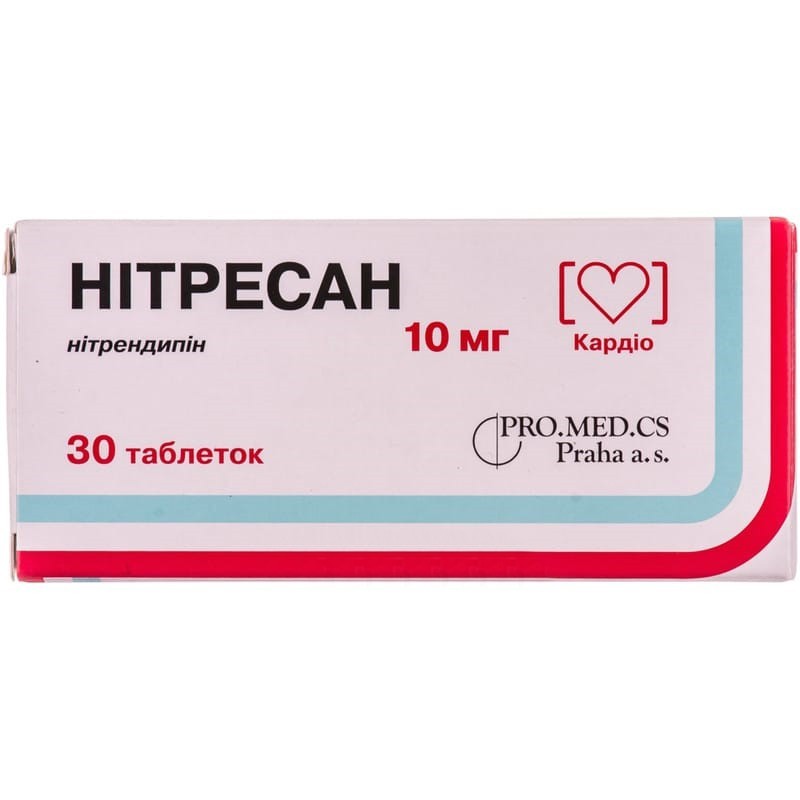



 Secure and encrypted payment processing
Secure and encrypted payment processing We ship to over 40 countries including the USA, UK, Europe, Australia and Japan
We ship to over 40 countries including the USA, UK, Europe, Australia and Japan Guaranteed refund or reship if you haven't received your order
Guaranteed refund or reship if you haven't received your orderNitresan tablets®"Used to treat essential hypertension.
The active substance is nitrendipine (one tablet contains 10 mg of nitrendipine).
Excipients: lactose monohydrate, corn starch, microcrystalline cellulose, magnesium stearate, povidone, sodium docusate.
Assign inside in the morning after eating. The tablets should be swallowed whole without chewing, washed down with a sufficient amount of water (for example, a glass). It is strictly forbidden to drink grapefruit juice.
The active substance nitrendipine is sensitive to light, so tablets should be removed from the blister just before use.
One tablet of Nitresan®"Take twice a day (morning and evening), which is 20 mg of nitrendipine per day. With an insufficient decrease in blood pressure, the doctor during treatment can double the daily dose and take 2 tablets twice a day, which is equivalent to a daily dose of 40 mg.
The maximum daily dose is 40 mg.
The dose and number of doses are set by the doctor individually. To achieve the maximum therapeutic effect, individual dosage of the drug is recommended depending on the condition of the patient, his reaction to the drug and tolerance. The duration of treatment is determined by the clinical condition of the patient.
Nitrendipine metabolism can slow down, leading to an undesirable decrease in blood pressure. Since the therapeutic effect can be enhanced and / or prolonged, it is recommended to start treatment with low doses (10 mg nitrendipine per day) under the supervision of a doctor.
In cases of a significant decrease in blood pressure, even with low doses, it is necessary to change the treatment.
Patients with impaired renal function of mild to moderate severity do not require special dose adjustments.
The drug is contraindicated during pregnancy.
Nitrendipine passes into breast milk. If necessary, the use of the drug should stop breast-feeding.
The drug is not used for children due to the lack of data on the effect of its effects and safe use.
At the beginning of treatment or when using high doses, or in combination therapy with other antihypertensive drugs, or while drinking alcohol, it is recommended to refrain from driving vehicles and from potentially dangerous activities that require increased attention and speed of psychomotor reactions, since with a decrease in blood pressure it can decrease the level of attention.
Hot flashes, headache, arterial hypotension (circulatory collapse), change in heart rate (tachycardia or bradycardia).
It is necessary to remove the drug from the body: rinse the gastrointestinal tract, take activated charcoal. Conduct careful monitoring of the state of vital functions of the patient. With a significant decrease in blood pressure, dopamine and norepinephrine should be taken. Attention should be paid to the possible negative effects of catecholamines (especially in relation to cardiac arrhythmias). With bradycardia, intravenous administration of atropine or orciprenaline (similar to the treatment of intoxication with other calcium channel blockers).It is possible to re-introduce 10 ml of 10% calcium gluconate or 10% calcium chloride, followed by calcium infusion (it is necessary to prevent the possible development of hypercalcemia). In such cases, catecholamines are also effective, but at higher doses. Further treatment is symptomatic.
Nitrendipine is not amenable to dialysis, therefore hemoperfusion and plasmapheresis will not be effective.
On the part of the immune system: infrequently - allergic reactions, including skin reactions and allergic edema / angiotics.
From the cardiovascular system: very often - peripheral edema (especially at the beginning of treatment, usually transient); often - at the beginning of treatment, angina attacks are possible or an increase in the frequency, duration and severity of angina attacks in patients suffering from this disease; palpitations, tachycardia; infrequently - arterial hypotension; rarely - leukocytoclastic vasculitis; very rarely - myocardial infarction.
On the part of the blood system and lymphatic system: very rarely - leukopenia, agranulocytosis. The composition of the peripheral blood returned to normal after discontinuation of the drug.
From the nervous system: very often - headache (especially at the beginning of treatment, usually mild and fleeting); infrequently - anxiety, sleep disturbances, paresthesia, dizziness, fatigue, tremors (at high doses), drowsiness, nervousness, migraine, hypesthesia.
From the side of the organs of vision: infrequently - impaired vision, blurred vision.
On the part of the hearing organs and the vestibular apparatus: infrequently - dizziness, tinnitus, vertigo.
From the respiratory system: infrequently - shortness of breath, nosebleeds.
From the digestive system: often - a feeling of fullness of the stomach; infrequently - nausea, diarrhea, vomiting, abdominal pain, dry mouth, constipation, gastroenteritis; very rarely - gingival hyperplasia.
From the kidneys and urinary tract: infrequently - peripheral edema of the lower extremities; rarely - urination; polyuria.
From the skin: very often - hot flashes (especially at the beginning of treatment, usually transient); infrequently - hypersensitivity reactions (pruritus, urticaria, erythema, rash, photosensitivity); very rarely - exfoliative dermatitis, angioedema, maculopapular rash.
From the musculoskeletal system: infrequently - arthralgia myalgia.
From the reproductive system and mammary glands: very rarely - erectile dysfunction, gynecomastia (in elderly patients), menorrhagia.
On the part of the liver and biliary tract: rarely - impaired liver function, increased levels of individual laboratory parameters (slight or moderate increase in transaminases).
Other: infrequently - runny nose, nonspecific pain, weight gain, excessive sweating; very rarely - fever.
Store in the original packaging at a temperature not exceeding 25 ° C, out of the reach of children and protected from light.
Shelf life is 4 years.